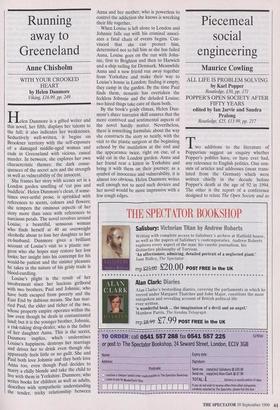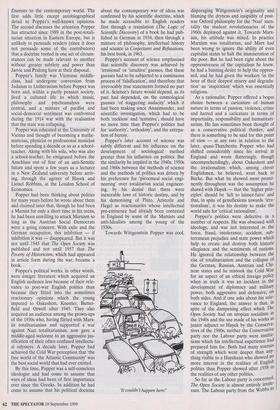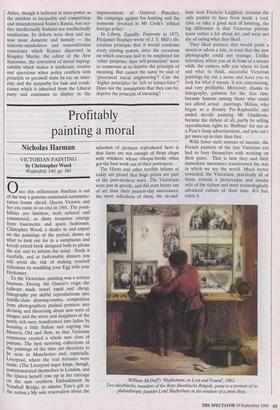Piecemeal social engineering
Maurice Cowling
ALL LIFE IS PROBLEM SOLVING by Karl Popper Routledge, £30, pp. 171 POPPER'S OPEN SOCIETY AFTER FIFTY YEARS edited by Ian Jarvie and Sandra Pralong Routledge, f25, £13.99, pp. 217 Two additions to the literature of Popperism suggest an enquiry whether Popper's politics have, or have ever had, any relevance to English politics. One con- sists of articles and addresses (most trans- lated from the German) which were written chiefly in the decade before Popper's death at the age of 92 in 1994. The other is the report of a conference designed to relate The Open Society and its Enemies to the contemporary world. The first adds little except autobiographical detail to Popper's well-known opinions. The second discusses the attention Popper has attracted since 1989 in the post-totali- tarian situation in Eastern Europe, but is unlikely to persuade readers (since it does not persuade some of the contributors) that a doctrine rooted in one set of circum- stances can be made relevant to another without greater subtlety and power than Jarvie and Pralong have at their disposal.
Popper's family was Viennese middle- class, had undergone conversion from Judaism to Lutheranism before Popper was born and, within a partly peasant society, lived a cultured life to which music, philosophy and psychoanalysis were central, and a mixture of pacifist and social-democrat sentiment was confronted during the 1914 war with the realisation that the state was collapsing.
Popper was educated at the University of Vienna and thought of becoming a mathe- matician, physicist or professional musician before spending a decade or so as a school- teacher. Along with his wife, who was also a school-teacher, he emigrated before the Anschluss out of fear of an anti-Semitic future and spent a few years as a lecturer in a New Zealand university before arriv- ing, through the agency of Hayek and Lionel Robbins, at the London School of Economics.
Popper had been thinking about politics for many years before he wrote about them and claimed later that, though he had been a Marxist for only a short time in his teens, he had been unwilling to attack Marxism so long as the Austrian Social Democrats were a going concern. With exile and the German occupation, this inhibition — if inhibition it was — disappeared. But it was not until 1945 that The Open Society was published and not until 1957 that The Poverty of Historicism, which had appeared in article form during the war, became a book.
Popper's political works, in other words, were émigré literature which acquired an English audience less because of their rele- vance to post-war English politics than because they fitted into the sometimes reactionary opinions which the young imputed to Oakeshott, Koestler, Butter- field and Orwell after 1945. They also acquired an audience among the grown-ups of the 1930s who, having flirted with Marx- ist totalitarianism and supported a war against Nazi totalitarianism, now gave a middle-aged welcome to an aggressive jus- tification of their often confused intellectu- al odysseys. A decade later, Popper had achieved the Cold War perception that 'the free world of the Atlantic Community' was the best social world that had ever existed.
By this time, Popper was a self-conscious ideologist and had come to assume that wars of ideas had been of first importance ever since the Greeks. In addition he had come to assume that his political doctrine about the contemporary war of ideas was confirmed by his scientific doctrine, which he made accessible to English readers first through a translation (The Logic of Scientific Discovery) of a book he had pub- lished in German in 1934, then through a mixture of philosophy, intellectual history and science in Conjectures and Refutations, his best book, in 1963.
Popper's account of science emphasised that scientific discovery was achieved by `irrational' or 'intuitive' guesses, that these guesses had to be subjected to a continuous process of 'falsification', and therefore that irrevocably true statements formed no part of it. Science's future would depend, as its past had depended, on the cosmological guesses 'of staggering audacity' which it had been making since Anaximander, and scientific investigation, which had to be both 'reckless' and 'tentative', should have no more time than Popper's politics had for 'authority', 'orthodoxy', and the extirpa- tion of heresy.
Popper's later account of science was subtly different and his influence on the development of sociological method greater than his influence on politics. But the similarity he implied in the 1940s, 1950s and 1960s between the methods of science and the methods of politics was driven by his preference for 'piecemeal social engi- neering' over totalitarian social engineer- ing, by his denial that there were inexorable laws of historic destiny, and by his demonising of Plato, Aristotle and Hegel as reactionaries whose intellectual pre-eminence had already been contested in England by some of the Marxists and anti-Idealists among the young of the 1930s.
Towards Wittgenstein Popper was cool, `It couldn't happen here!' disparaging Wittgenstein's originality and blaming the dryness and insipidity of post- war Oxford philosophy for the 'Nazi' men- tality the student revolutionaries of the 1960s deployed against it. Towards Marx- ism, his attitude was mixed. In practice Marxism was totalitarian, and Marx had been wrong to ignore the ability of even capitalist states to halt the immiseration of the poor. But he had been right about the oppressiveness of the capitalism he knew, he had a burning desire to help the oppres- sed, and he had given the workers 'in the hour of their deepest misery and degrada- tion' an 'inspiration' which was essentially religious.
As a rationalist, Popper offered a bogus choice between a caricature of human nature in terms of passion, violence, crime and hatred and a caricature in terms of impartiality, responsibility and humanitari- anism. He has sometimes been thought of as a conservative political thinker, and there is something to be said for this point of view — at any rate in relation to the later, quasi-Thatcherite Popper who had shifted considerably since his arrival in England and wrote flatteringly, though uncomprehendingly, about Oakeshott and the irrationalism which, among clever Englishmen, he believed, went back to Burke. But what he showed most promi- nently throughout was the assumption he shared with Hayek — that the 'higher prin- ciples' should be 'left to laissez-faire' and that, in spite of genuflexions towards 'irra- tionalism', it was his destiny to make the world safe for 'critical rationalism'.
Popper's politics were defective in a number of respects. He was obsessed with ideology, and was not interested in the force, fraud, intolerance, accident, sub- terranean prejudice and state power which help to create and destroy both historic allegiance and the sentiments of nations. He ignored the relationship between the rise of totalitarianism and the collapse of the German, Russian, Austrian and Chi- nese states and he mistook the Cold War for an aspect of an ethical foreign policy when in truth it was an incident in the development of diplomacy and military power, both aggressive and defensive, on both sides. And if one asks about his rele- vance to England, the answer is that, in spite of the dampening effect which The Open Society had on utopian socialism in the 1940s and the use made of his works as junior adjunct to Hayek by the Conserva- tives of the 1980s, neither the Conservative party nor the Labour party were institu- tions which his intellectual experience had prepared him for. Both had many sources of strength which went deeper than any- thing visible to a Hayekean who showed no more interest in the realities of English politics than Popper showed after 1938 in the realities of any other politics. So far as the Labour party is concerned, The Open Society is almost entirely irrele- vant. The Labour party from the Webbs to Attlee, though it believed in state-power as the antidote to inequality and competition and misunderstood Stalin's Russia, was nei- ther intellectually Stalinist nor intellectually totalitarian. Its defects were then and are now more domestic and homely — the minority-mindedness and nonconformist conscience which Keynes discerned in Kingsley Martin, the editor of the New Statesman, the conviction of moral impreg- nability which makes it intolerant, evasive and querulous when policy conflicts with principle or goodwill stubs its toe on inter- ests, and the sympathy for fads and crank- causes which it inherited from the Liberal party and continues to display in the imprisonment of General Pinochet, the campaign against fox hunting and the nonsense involved in Mr Cook's 'ethical foreign policy'.
In Liberty, Equality, Fraternity in 1873, Fitzjames Stephen wrote of J. S. Mill's lib- ertarian principle that it would condemn every existing system, since the occasions on which coercion had to be employed for `other purposes than self-protection' were so numerous as to deprive the principle of meaning. But cannot the same be said of `piecemeal social engineering'? Can the `higher principles' be 'left to laissez-faire'? Does not the assumption that they can be, deprive the principle of meaning?




























































































 Previous page
Previous page